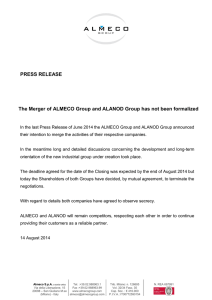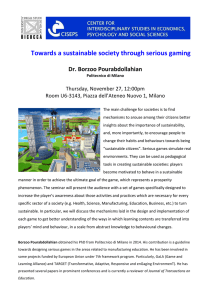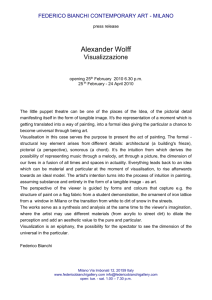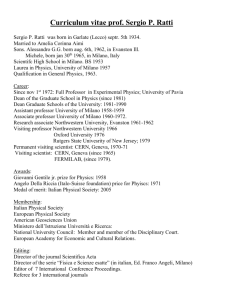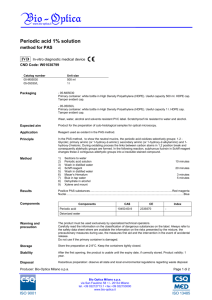Proff. Maurizio Luigi Baussola
advertisement
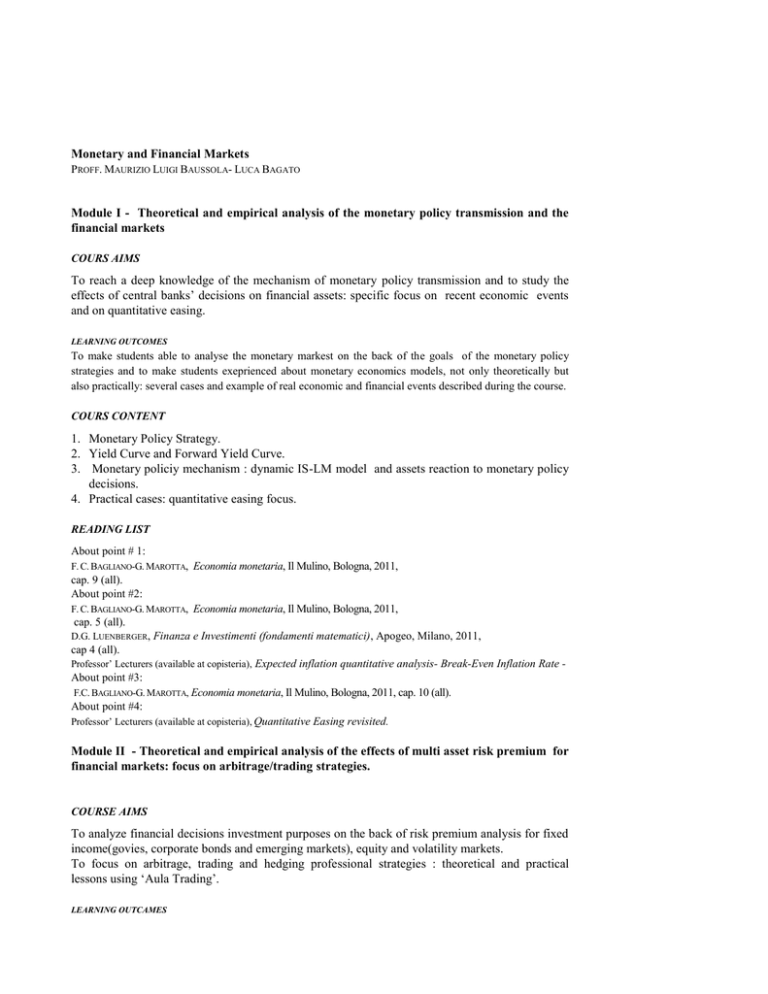
Monetary and Financial Markets PROFF. MAURIZIO LUIGI BAUSSOLA- LUCA BAGATO Module I - Theoretical and empirical analysis of the monetary policy transmission and the financial markets COURS AIMS To reach a deep knowledge of the mechanism of monetary policy transmission and to study the effects of central banks’ decisions on financial assets: specific focus on recent economic events and on quantitative easing. LEARNING OUTCOMES To make students able to analyse the monetary markest on the back of the goals of the monetary policy strategies and to make students exeprienced about monetary economics models, not only theoretically but also practically: several cases and example of real economic and financial events described during the course. COURS CONTENT 1. Monetary Policy Strategy. 2. Yield Curve and Forward Yield Curve. 3. Monetary policiy mechanism : dynamic IS-LM model and assets reaction to monetary policy decisions. 4. Practical cases: quantitative easing focus. READING LIST About point # 1: F. C. BAGLIANO-G. MAROTTA, Economia monetaria, Il Mulino, Bologna, 2011, cap. 9 (all). About point #2: F. C. BAGLIANO-G. MAROTTA, Economia monetaria, Il Mulino, Bologna, 2011, cap. 5 (all). D.G. LUENBERGER, Finanza e Investimenti (fondamenti matematici), Apogeo, Milano, 2011, cap 4 (all). Professor’ Lecturers (available at copisteria), Expected inflation quantitative analysis- Break-Even Inflation Rate - About point #3: F.C. BAGLIANO-G. MAROTTA, Economia monetaria, Il Mulino, Bologna, 2011, cap. 10 (all). About point #4: Professor’ Lecturers (available at copisteria), Quantitative Easing revisited. Module II - Theoretical and empirical analysis of the effects of multi asset risk premium for financial markets: focus on arbitrage/trading strategies. COURSE AIMS To analyze financial decisions investment purposes on the back of risk premium analysis for fixed income(govies, corporate bonds and emerging markets), equity and volatility markets. To focus on arbitrage, trading and hedging professional strategies : theoretical and practical lessons using ‘Aula Trading’. LEARNING OUTCAMES To make the student in the condition to explore and to understand the financial markets microstructure through academic tools, historical and technical charts analysis and practical experiences to be' carried out in Aula trading. The Course will describe the main drivers of financial assets risk premium about: equity, government bonds, credit and corporate bonds and equity option volatility. The student will be' able to make practical simulated trading in Aula Trading to understand better financial risk premium and the connections and correlations between different financial asset classes. The Course will conclude with a special section dedicated to the use of Exchanged Traded Funds (ETFs); there will be the partecipation of a speaker from Borsa Italiana and later the student will be' able to make practical simulated management decision for a multi asset ETFs portfolio in Aula trading. COURSE CONTENT 1. 2. 3. 4. 5. 6. 7. 8. Historical and Technical analysis for financial markets: principal financial trends. Seasonal and secular patterns and financial markets expected returns. Psicology and arbitrage: Long Term Capital Management case. Equity risk premium. Bond risk premium. Credit risk premium. Equity volatility selling strategies. Exchange Traded Funds (ETF) focus. READING LIST About point #1: A. ILMANEN, Rendimenti Attesi, Milano, Egea, 2012, cap. 2 (all). D.G. LUENBERGER, Finanza e Investimenti (fondamenti matematici), Apogeo, Milano, 2011, capp. 2, 3 e 7 (only for specific definitions about internal rate of return, duration and Sharpe ratio). R.COREY, Guida Completa al Trading, Hoepli, Milano, 2012 (arguments to be defined by the teacher). About point #2: A. ILMANEN, Rendimenti Attesi, Milano, Egea, 2012, cap. 3 (all). R.COREY, Guida Completa al Trading, Hoepli, Milano, 2012 (arguments to be defined by the teacher). About point#3: Teacher’s lecture notes. A. ILMANEN, Rendimenti Attesi, Milano, Egea, 2012, capp. 6 e 7 (hedge funds sections only). About point#4: A. ILMANEN, Rendimenti Attesi, Milano, Egea, 2012, cap. 8 (all). D.G. LUENBERGER, Finanza e Investimenti (fondamenti matematici), Apogeo, Milano, 2011, cap.7 (beta definition only). R.COREY, Guida Completa al Trading, Hoepli, Milano, 2012 (arguments to be defined by the teacher). About point#5: A. ILMANEN, Rendimenti Attesi, Milano, Egea, 2012, cap. 9 (all). D.G. LUENBERGER, Finanza e Investimenti (fondamenti matematici), Apogeo, Milano, 2011, cap. 4 (all). R.COREY, Guida Completa al Trading, Hoepli, Milano, 2012 (arguments to be defined by the teacher). About point#6: A. ILMANEN, Rendimenti Attesi, Milano, Egea, 2012, cap. 10 (all). D.G. LUENBERGER, Finanza e Investimenti (fondamenti matematici), Apogeo, Milano, 2011, cap.10 (rates swap definition only). R.COREY, Guida Completa al Trading, Hoepli, Milano, 2012 (arguments to be defined by the teacher). About point#7: A. ILMANEN, Rendimenti Attesi, Milano, Egea, 2012, cap. 15 (all). D.G. LUENBERGER, Finanza e Investimenti (fondamenti matematici), Apogeo, Milano, 2011, cap.12 e 13. R.COREY, Guida Completa al Trading, Hoepli, Milano, 2012 (arguments to be defined by the teacher). AULA TRADING About point#8: Teacher’s lecture notes. R.COREY, Guida Completa al Trading, Hoepli, Milano, 2012 (arguments to be defined by the teacher). AULA TRADING Event with a Borsa Italiana speaker. TEACHING METHOD Classrooms Lessons and Practical lessons in Aula Trading. ASSESSMENT METHOD Wrtitten examination. Proff. Baussola and Bagato receive students as at described on Economics Faculty ‘s bacheca.
